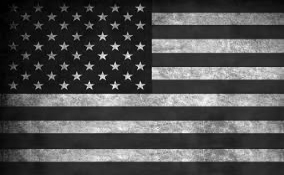This is an article that I wrote in June of 2003, long before I began blogging. It explains pretty well, I think, why I don’t fly the Stars and Stripes much anymore.

Among the Believers
“In each generation, with toil and tears, we have had to earn our heritage again. If we fail now, we shall have forgotten in abundance what we learned in hardship: that democracy rests on faith, that freedom asks more than it gives, and that the judgment of God is harshest on those who are most favored.
“If we succeed, it will not be because of what we have, but it will be because of what we are; not because of what we own, but, rather because of what we believe. For we are a nation of believers.”
— Inaugural Speech of Lyndon Baines Johnson, January 1965
For many years I would fly an American flag at my home on every day that weather permitted. From my earliest recollection it has represented something very deep and spiritual to me. It has represented unity.
At first, it was the unity of national identity – my tribe. In Oreana, Illinois, USA the tribe’s members were typically native midwestern, Anglo and Christian, but I had the sense very early that there was a bigger tribe. I was taught that America was a big place where all kinds of people came from all over the world. E Pluribus Unum – “From the Many, One.” What made us “one” people? Why did so many folks come from so far away and endure such hardship? They did it because they wanted to be free. So, sometime during grade school the flag began to represent freedom.
As I grew a little older, I began to learn that freedom is relative. I remember seeing Norman Rockwell’s depiction of “The Four Freedoms” – freedom from fear, freedom of worship, freedom of speech, freedom from want. Growing up in the 1960s, it was easy to sense that some people living among us weren’t completely free. The ideal wasn’t being fully expressed and experienced yet. We had to keep working for it. This was only right and just and our duty as Americans. So the flag began to represent justice.
When I was 11 we moved to Decatur and I still recited dutifully with my hand over my heart every morning in home room – “with liberty and justice for all.” The flag was so beautiful. It embodied the most noble and desperate longings of humankind, and it belonged to me. It belonged to all of us at Stephen Decatur High School. It belonged to the Blacks and the Italians and the Greek girls who came to school with ashes on their foreheads at the beginning of Lent. It belonged to my history teacher, who was Jewish. It belonged to every creed and race, even us mutts of generic European extraction. It belonged to us all. The ideal belonged to us all. The dream belonged to every one of us, and we belonged to each other. One tribe out of many. E Pluribus Unum.
Now that I’m older, I realize how naïve some of my perceptions may have been about our distance from the ideal. The truth is that for many people in our society the words “liberty and justice for all” have sometimes been akin to a cruel joke. Despite that, I’ve never once doubted the ideal itself.
People used to poke fun at me for flying my flag all the time. “What’s up with the flag? It’s not a holiday today.” Then it seemed as if overnight that changed. Suddenly, there were flags everywhere. Stores were sold out of flags that had collected dust for years. People put flag decals on their cars and taped newsprint flags to their windows.
I’d like to fly my flag along with the others, but I’m pretty sure it doesn’t mean the same thing to me as it does to most of the people waving it so frantically these days. In fact, the sentiment expressed by many is like some dark, shadow version of my American Ideal. It’s full of anger and revenge and political partisanship blended with no small measure of religious and racial bigotry. My flag isn’t like that. My flag isn’t about hatred or fear.
I worry about my flag and my country. The America we live in today seems so different from the America of my enduring imagination. I wonder if that America will survive this age of abundance. We’re obviously at a crossroads, at a time both of great opportunity and grave danger, and may well look back on this decade as a defining moment for generations to come.
I don’t know how well my generation will stand the test of “toil and tears” required to earn our heritage. I do know that what we have and what we own, our military and economic hegemony, these things will inevitably pass. What we are, what we stand for – unity, freedom, justice – these ideals will last.
Can we become, finally and truly, “a nation of believers?”